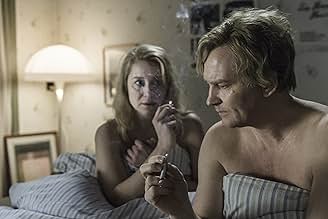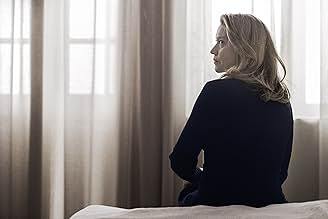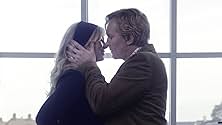IMDb-BEWERTUNG
6,4/10
8516
IHRE BEWERTUNG
Eine Geschichte über den Konflikt zwischen persönlichen Wünschen und der Solidarität und Toleranz in einer dänischen Kommune in den 1970ern.Eine Geschichte über den Konflikt zwischen persönlichen Wünschen und der Solidarität und Toleranz in einer dänischen Kommune in den 1970ern.Eine Geschichte über den Konflikt zwischen persönlichen Wünschen und der Solidarität und Toleranz in einer dänischen Kommune in den 1970ern.
- Auszeichnungen
- 6 Gewinne & 21 Nominierungen insgesamt
Empfohlene Bewertungen
"The Commune" brings the story of Eric and Anna. As the movie opens, we see the couple looking at the huge house of Erik's deceased father. The couple really can't afford to keep the house, but at Anna's suggestion, they invite several other people to join them (and pay rent). All together, they are now 9, of which 2 kids (including Anna and Erik's 14 yr. old daughter Freja). Then, just as things seem to go quite well, Erik starts an affair with Emma, a 24 yr. old student of his. What impact will that have on the commune? To tell you more of the plot would spoil your viewing experience, you'll just have to see for yourself how it all plays out.
Couple of comments: this is the latest movie from Danish writer-director Thomas Vinterberg, whose work includes 2015's "Far From the Madding Crowd" and before that, the excellent "Hunt" in 2012. Here, after going "Hollywood" in his previous movie, he returns to his Danish roots and brings us a story set in the 1970s, when the concept of morality and conformity were quite different from what we now know them to be. This movie turned out to be a bit different from what I expected it to be. It's not really about "hippies living together and being one with nature", but rather a study of what one man's affair means for the immediate group around him, including of course first and foremost his wife, a slightly aging but very popular TV news anchor. The film also spends quite of time looking at the 14 yr. old girl, and in that sense is also partly a coming of age movie. There are a couple of acting performances that will knock you out, none more so that Trine Dyrholm in the role of Anna, but Ulrich Thomsen as Erik certainly should be mentioned to.
I recently saw "The Commune" at the Landmark E Street Cinema in Washington DC. The Saturday evening screening that I saw it at was attended okay but not super. That's a shame, but maybe this movie will find a wider audience on Amazon Instant Video or eventually on DVD/Blu-ray. If you are in the mood for a quality foreign film that is in part a relationship drama and in part a coming-of-age movie, I'd readily recommend you see this out.
Couple of comments: this is the latest movie from Danish writer-director Thomas Vinterberg, whose work includes 2015's "Far From the Madding Crowd" and before that, the excellent "Hunt" in 2012. Here, after going "Hollywood" in his previous movie, he returns to his Danish roots and brings us a story set in the 1970s, when the concept of morality and conformity were quite different from what we now know them to be. This movie turned out to be a bit different from what I expected it to be. It's not really about "hippies living together and being one with nature", but rather a study of what one man's affair means for the immediate group around him, including of course first and foremost his wife, a slightly aging but very popular TV news anchor. The film also spends quite of time looking at the 14 yr. old girl, and in that sense is also partly a coming of age movie. There are a couple of acting performances that will knock you out, none more so that Trine Dyrholm in the role of Anna, but Ulrich Thomsen as Erik certainly should be mentioned to.
I recently saw "The Commune" at the Landmark E Street Cinema in Washington DC. The Saturday evening screening that I saw it at was attended okay but not super. That's a shame, but maybe this movie will find a wider audience on Amazon Instant Video or eventually on DVD/Blu-ray. If you are in the mood for a quality foreign film that is in part a relationship drama and in part a coming-of-age movie, I'd readily recommend you see this out.
Vinterberg, understandably having grown up in a commune, doesn't properly establish the hippy commune lifestyle. Probably because to him, that's just what he grew up with. He assumes you already know (and I do) but most people don't (or haven't thought about it) so the film feels severely lacking in world building. If this movie were an essay the first paragraph with the hypothesis is missing. Tell us a little bit about the ideology behind the choice in lifestyle; you did it beautifully did with Druk! Without it, the dramatic, emotional and ideological arithmetic doesn't quite add up. Have Ole tells us a bit about his left wing literature! Not to mention, Vinterberg shares nothing of the drug culture that the hippy lifestyle so adamantly relies on. Squash any human instinct/desire with a physical simulation; that's the hippy way. Feel unhappy: drink. You don't get that spark from learning something new? Just take a smoke and you'll get that spark relearning things you already know. Everything is material for the hippy, everything superficial. Real emotions always denied because we have pills for that! This film severely lacked a proper set up of that world in the first half.
That being said, this film develops into a deeply pertinent and important message. He perfectly diagnoses the problems with a hippy approach to a family structure. And I know this because my own family was a victim of this way of life. The mom in the film is my mom. The dad is my dad. The people in the film are from 70s Denmark, and my parents are from 90s LA. And while we live miles apart, the way of thinking leads to the same outcomes, and I have to repeat: Vinterberg perfectly diagnoses the problem with this type of thinking. While the woman may be the one suggesting a free love lifestyle, it's ultimately the women who will always suffer. The patriarch is to blame because he is the leader, whether or not he rhetorically offloads his duty to others.
The institution of marriage protects women, as their prospects of love virtually become null and void once they become old and ugly. The man however can remarry. This is why marriage exists. My parents were stupid enough to never make this observation and like in the movie, my mom ended up hooked on pills and alcohol while my father ran off with his tight new muse. And if you think the corporate world has any interest in supporting old women, think again.
That being said, this film develops into a deeply pertinent and important message. He perfectly diagnoses the problems with a hippy approach to a family structure. And I know this because my own family was a victim of this way of life. The mom in the film is my mom. The dad is my dad. The people in the film are from 70s Denmark, and my parents are from 90s LA. And while we live miles apart, the way of thinking leads to the same outcomes, and I have to repeat: Vinterberg perfectly diagnoses the problem with this type of thinking. While the woman may be the one suggesting a free love lifestyle, it's ultimately the women who will always suffer. The patriarch is to blame because he is the leader, whether or not he rhetorically offloads his duty to others.
The institution of marriage protects women, as their prospects of love virtually become null and void once they become old and ugly. The man however can remarry. This is why marriage exists. My parents were stupid enough to never make this observation and like in the movie, my mom ended up hooked on pills and alcohol while my father ran off with his tight new muse. And if you think the corporate world has any interest in supporting old women, think again.
The story is not a good study of characters. All of them are almost caricatures. When the existential problem between Erik and Ana arises, both behaves in a way too much elementary, taking in account the gravity of the situation which is going on. More precisely (1) Erik is absolutely incapable to realise that he is ruining the emotional life and the self respect of the woman with whom he has been married and living in a pleasant way during at least fifteen years. A woman who proved to be generous when she accepted that Emma could live with the community, and who had probably fantasies of living a ménage à trois, along with Erik and Emma, thing that I think reasonable and human, considering what was going on. Erik sticks with Emma as if he hadn't any responsibility with regard to Anna feelings. (2) Anna is incapable to react in time to rescue her dignity which is being hurt by the irresponsible behaviour of Erik. The rest of the characters manifest themselves very poorly with respect to the crisis between Erik an Anna. Except the young Freja, daughter of Erik and Anna which is the only one capable to say that her mother must leave the community and seek for a new life. In short, Erik who is almost a pivot of the whole story, behaves - in the light of existentialist philosophy - as an individual with bad faith. I would add also, on my part, that he is a kind of mediocre individual.
This is quite a slow burner, plot pace wise. Its mostly about family dynamics and trust. It took a while for me to feel especially interested in the characters but I thought it was somewhat of a powerful watch by the time it headed towards the end and I would say it may make you think.
If your not keen on character focussed dramas then this won't be for you. Also of course you likely have to rely on the subtitles, as its in Danish, although I was pleased to see that the subtitles were quite large in terms of text size, compared to other films with smaller subtitles, so if anything it was slightly less of an issue than it might have been. I felt sorry for the wife Anna and I did find myself wondering what might happen next, as things moved on plot wise but it is, as I say, a relatively slow burner, so don't expect fast paced action or anything of that sort. Its a reasonably intriguing watch and overall I suppose I'd say its a good watch, hence my rating.
If your not keen on character focussed dramas then this won't be for you. Also of course you likely have to rely on the subtitles, as its in Danish, although I was pleased to see that the subtitles were quite large in terms of text size, compared to other films with smaller subtitles, so if anything it was slightly less of an issue than it might have been. I felt sorry for the wife Anna and I did find myself wondering what might happen next, as things moved on plot wise but it is, as I say, a relatively slow burner, so don't expect fast paced action or anything of that sort. Its a reasonably intriguing watch and overall I suppose I'd say its a good watch, hence my rating.
Kollektivet (original title) or The Commune (English title), the new movie from director Thomas Vinterberg (known for Festen - The Celebration - 1998, Submarine - 2010 and Jagten - The Hunt - 2013), one of the founders of the film movement Dogme 95, which seeks to create a more realistic and less commercial cinema, deals with a family in the 70s, formed by the father Erik (played by Ulrich Thomsen, known for Festen - The Celebration - 1998 and Adams æbler - Adam's Apples - 2005), the mother Anna (represented by Trine Dyrholm, known for Festen - The Celebration - 1998 and DeUsynlige - Troubled Water - 2008) and the daughter Freja (played by Martha Hansen). Erik inherits the house of his family after the death of his father, but considering it very large and with high maintenance costs he is willing to sell it. However, his wife convinces him to turn the house into a kind of community, inviting some friends and even interviewing strangers to share the house and to help pay the bills. Living in a group, like a big family, they have dinners, parties and regular meetings so that important matters are made democratically. But the utopia around this experiment begins to be questioned when a love affair shakes the small community.
Kollektivet hits to portray very well the time when the story takes place: the 70s in Copenhagen. The production design, costumes and characters's characterization, expressed by the clothes, hair and costumes, confer credibility and immerse the viewer in the plot. But the film errs for not develop enough the characters that are not part of the central plot. The director should have further explored the group in conflict scenes and the writer could have better elaborated the difficulties of social life that are inherent to a life in a community. As it was written the supporting actors add little to the story and the parallel plot of Freja's journey into adulthood opposed to the reflection of everything that happens within the community deserved to be better developed.
The big highlight is the actress Trine Dyrholm, who received the Silver Bear for Best Actress at the Berlin Film Festival this year for her excellent performance. The most dramatic scenes and the strongest blows that we took in the feature film are starred by her character, Anna, a television news presenter. The actress representation convinces not only because her ability to express emotions in times of joy or in the darkest moments, but by the naturalness of interpretation, which makes the viewer forget that it's just a role play.
Convivial challenges can be overcome? To what extent a community project should override the individual interests? What is more important: the individual or the collective? Life in community is possible? These are some of the questions that The Commune tries to address, but ends up doing superficially. Director Thomas Vinterberg had talent to produce a film with a final result much better than he produced.
Originally posted in: https://vikingbyheart.blogspot.com.br
Kollektivet hits to portray very well the time when the story takes place: the 70s in Copenhagen. The production design, costumes and characters's characterization, expressed by the clothes, hair and costumes, confer credibility and immerse the viewer in the plot. But the film errs for not develop enough the characters that are not part of the central plot. The director should have further explored the group in conflict scenes and the writer could have better elaborated the difficulties of social life that are inherent to a life in a community. As it was written the supporting actors add little to the story and the parallel plot of Freja's journey into adulthood opposed to the reflection of everything that happens within the community deserved to be better developed.
The big highlight is the actress Trine Dyrholm, who received the Silver Bear for Best Actress at the Berlin Film Festival this year for her excellent performance. The most dramatic scenes and the strongest blows that we took in the feature film are starred by her character, Anna, a television news presenter. The actress representation convinces not only because her ability to express emotions in times of joy or in the darkest moments, but by the naturalness of interpretation, which makes the viewer forget that it's just a role play.
Convivial challenges can be overcome? To what extent a community project should override the individual interests? What is more important: the individual or the collective? Life in community is possible? These are some of the questions that The Commune tries to address, but ends up doing superficially. Director Thomas Vinterberg had talent to produce a film with a final result much better than he produced.
Originally posted in: https://vikingbyheart.blogspot.com.br
Wusstest du schon
- WissenswertesThe film is based on Thomas Vinterberg's play of the same name, which is inspired by his colourful childhood in an academic commune north of Copenhagen.
- PatzerThe signs on the bus stops were not introduced until the late 80's or 90's.
Top-Auswahl
Melde dich zum Bewerten an und greife auf die Watchlist für personalisierte Empfehlungen zu.
- How long is The Commune?Powered by Alexa
Details
- Erscheinungsdatum
- Herkunftsländer
- Offizielle Standorte
- Sprache
- Auch bekannt als
- The Commune
- Drehorte
- Hellerup, Sjælland, Dänemark(location)
- Produktionsfirmen
- Weitere beteiligte Unternehmen bei IMDbPro anzeigen
Box Office
- Bruttoertrag in den USA und Kanada
- 38.737 $
- Eröffnungswochenende in den USA und in Kanada
- 9.249 $
- 21. Mai 2017
- Weltweiter Bruttoertrag
- 4.410.339 $
- Laufzeit1 Stunde 51 Minuten
- Farbe
- Sound-Mix
- Seitenverhältnis
- 2.35 : 1
Zu dieser Seite beitragen
Bearbeitung vorschlagen oder fehlenden Inhalt hinzufügen






























